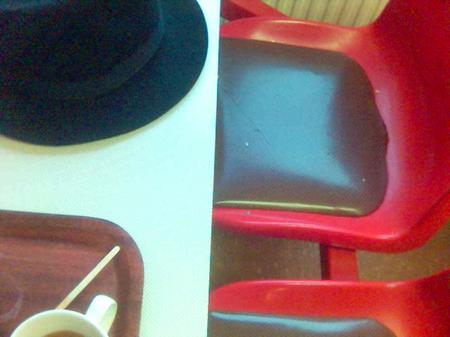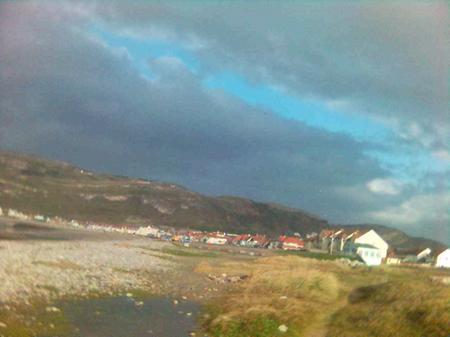December 29, 2004
DEGANWY DIARY 2
Christmas Day
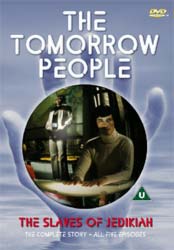
‘Your children are not your children, for they dwell in the house of tomorrow, which you cannot visit even in your dreams.’
- Epigraph on the DVD of the first series of The Tomorrow People, my brother’s Christmas present to me.
Intermittent flurries of snow, snow on the peaks of the mountains we can see from our front room… but not a white Christmas, quite.
By the estuary, a flock of what we later determine might be sandpipers in flight. The astonishing cybernetics of flocking. The flock as flight machine in which individual birds are micro-sensitive components, so hyperfast in its vertiginous veering changes of direction that the human perceptual-conscious system hasn’t a hope of keeping track.
Kylie megamix on TOTP… reminding us of how much enjoyment she could provide when she was just a flesh component in the SAW hit machine… before her main job was Being Kylie, as it is now…. … It was like the Faustian deal with the tabloids to necromantically revive her career stipulated that, if she really wanted to come back, all she could do was play the simpering simpersona, the death mask surgical-smiling stepford sex worker, FOREVER….
Lean’s Great Expectations: a study in concision and compression. You sigh with relief and recognition, remembering there is nothing remotely theatrical about Lean’s expressionistic version of Dickens’ Grimmest fairy tale. Character actors seemingly selected more for how their features will cast shadows than for their capacity to declaim. (If that was the case, naturally, I approve.)
Exactly when was it that the British lost the ability to think filmically?
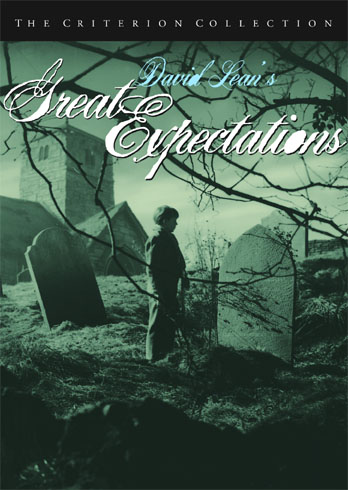
Great Expectations, a misogynistic-Masochistic delirium, in which Dickens imagines the Lady Thing – the sweetest queen, the unattainable woman-object - cooked up in a lab of female resentment and revenge. A Horror that is closer to Blade Runner than Vertigo: there is no ‘real’ Estella in the way that there is a ‘real’ Judy distinct from the fantasmatic Madeleine. The Estella-ID is a construct all the way down. Peel it away, and there is … Nothing (which vacancy is the perfect support for Pip’s fantasies, of course).
For that reason, it’s necessarily the case that any actual actress must needs fall short of achieving the sublime dignity of Das Ding. Perhaps the screen Estella should have been a blank space…. In the way that Pip is shot, late on in the film, coming into a doorway, just a top-hatted silhouette, a Void, the filling out of someone else's (Magwich's) fantasy.
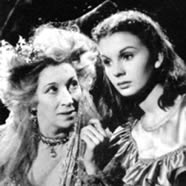
In Satis House, Estella and Pip are meat-marionettes in the deathly eternity of Miss Havisham’s externalized unconscious (time and space mean nothing in the Ucs – Freud), the one already a replicant-Femme Fatale cruelty machine (‘I have no heart, Pip’) refurbished with false memory, the other the ‘coarse labouring boy’ for whom the simulation is played out, awaiting his own destiny as the victim-plaything in another’s fantasy. You can plot lines from here to the frustration and rage of the Who’s ‘Substitute’, much of the Kinks, the Jam, the Smiths: the English interlock of class and desire. Simultaneous, irreconcilable pulls: to make something of yourself and to be true to where you have come from. English, all-too English, which is why the American version of a few years back made no sense. America prides itself, is ideologically structured around, what must always here be a source of unbearable shame.
Sex is semiotic through and through in Great Expectations, staturated with status-lust. Does Pip want to be a gentleman for the sake of Estella, or does he want Estella because she (seems to be) ‘of pure and noble breed’? Desire is irreducibly social from the start, Estella inseparable from the scenes and settings in which she is encountered. Dickens is well aware that, in love, the (co)incidental, the contingent becomes the Necessary. THAT was where we met, THAT day, you wore THAT dress….
(btw, it’s impossible to imagine a novel written from the POV of Estella, because the Horror of Estella is that she has no point of view, no interiority [‘no heart’], she is nothing apart from what she seems to be to men.)
The comparison with Harry Potter on BBC1 does Chris Columbus’ sloppy cash-in no favours.
I haven’t seen it before and try to make myself show some interest whilst cooking dinner.
I can’t. This is possibly the least magical film ever made. Looking for the fantasmatic in a Fantasy flick is like searching for politics in the House of Commons. A joyless digital pantomime, lit like a supermarket, with that strange flatness that is the signature of CGI productions. Lots of kids being ‘surprised’ and ‘awestruck’, going WOOOOOOOOOOAHHHHHHHH (a sound that only evokes Steven Spielberg trying to evoke children being surprised and awestruck). Flashing lights and crashing noises, curiously reminiscent of the video for ‘Total Eclipse of the Heart’. And everything is SO BIG.
Ac-Tor knights allowed to do what they do best, i.e. ham it up and reduce cinema to the level of theatre. Maggie Smith, Zoe Wannamaker, could anything be more Sunday afternoon familiar, more Sunday supplement worldly? Impossible to imagine this being watched in 50 years as the pre-digital Disney films still are.
It’s car boot sale cinema, a shoddy piece of merchandising, a disposable testament to Millennium Dome Capitalism. Like the Watchowski Brothers and Tarantino, Rowling is a marketing genius, nothing more. Postmodern gangster, postmodern SF, postmodern Fantasy. Give people exactly what they remember a genre is all about, add a smidgeon of irony/ contemporary cultural reference to taste, count the money.
Plus there’s something disgustingly Blairite about all this Public School shit. If you dweam and dweam and bewieve, really bewieve are very very lucky, you too can go to a BIG school with Houses and blazers, ancient rule books, competitive sports and bewhiskered old patriarchs…. Because of course that’s what we all want.
From Harry to Dennis Potter.
White magic of Oedipus. Everything compelling, disturbing and exhilarating about Potter is lost beneath a ponderous parade of personal anecdote in the deeply disappointing BBC2 documentary produced to commemorate the tenth anniversary of his death. All due respect, but did we really have to hear about what his family think at such length? Where were the critics, the theorists?
Biographism is the death of literature. Discuss.
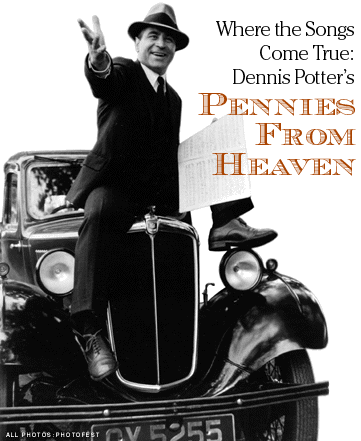
Point is, Potter’s life was up there, onscreen. Not straightforwardly - there was synthesis, compression, reversal, disavowal, all the dream work, naturally. And not presented with the tiresome faux-objective empirico-mongering that is now near-obligatory amongst documentary makers. The reason why the plays are infinitely more Real than this real life reality TV (in which people, as ever, play themselves, badly) is because they recognize that the fantasmatic is integral to any possible subjective experience.
But all this is ignored, because, in order to flatten out Potter’s work into biographic expressivism, his modernist/ formalist innovations have to be downplayed. Don’t Pennies from Heaven and The Singing Detective prove the point I was trying to make last time, though? Structural analysis of songs – and of The Song - doesn’t preclude the songs doing their old black magic. To be in love is to be lip synching to someone else’s composition, to offer a karaoke rendition of the oldest number in the songbook.
Have to go outside. The women in my life will disagree (Freud: what do women want?’; Infinite Thought: ‘to be WARM’), but this cold thing is really literal; the meat-TV-central heating machine is enervating, a few hours of carnal consumption and a drowsy numbness pains my sense, whereas the Cold is stimulating, revives thought, animation. A cigarette that the wind smokes more of than I do dissolves into paper and sparkles in double quick time. Full moon I think. Deep darkness, hills bible black, as DT said.
